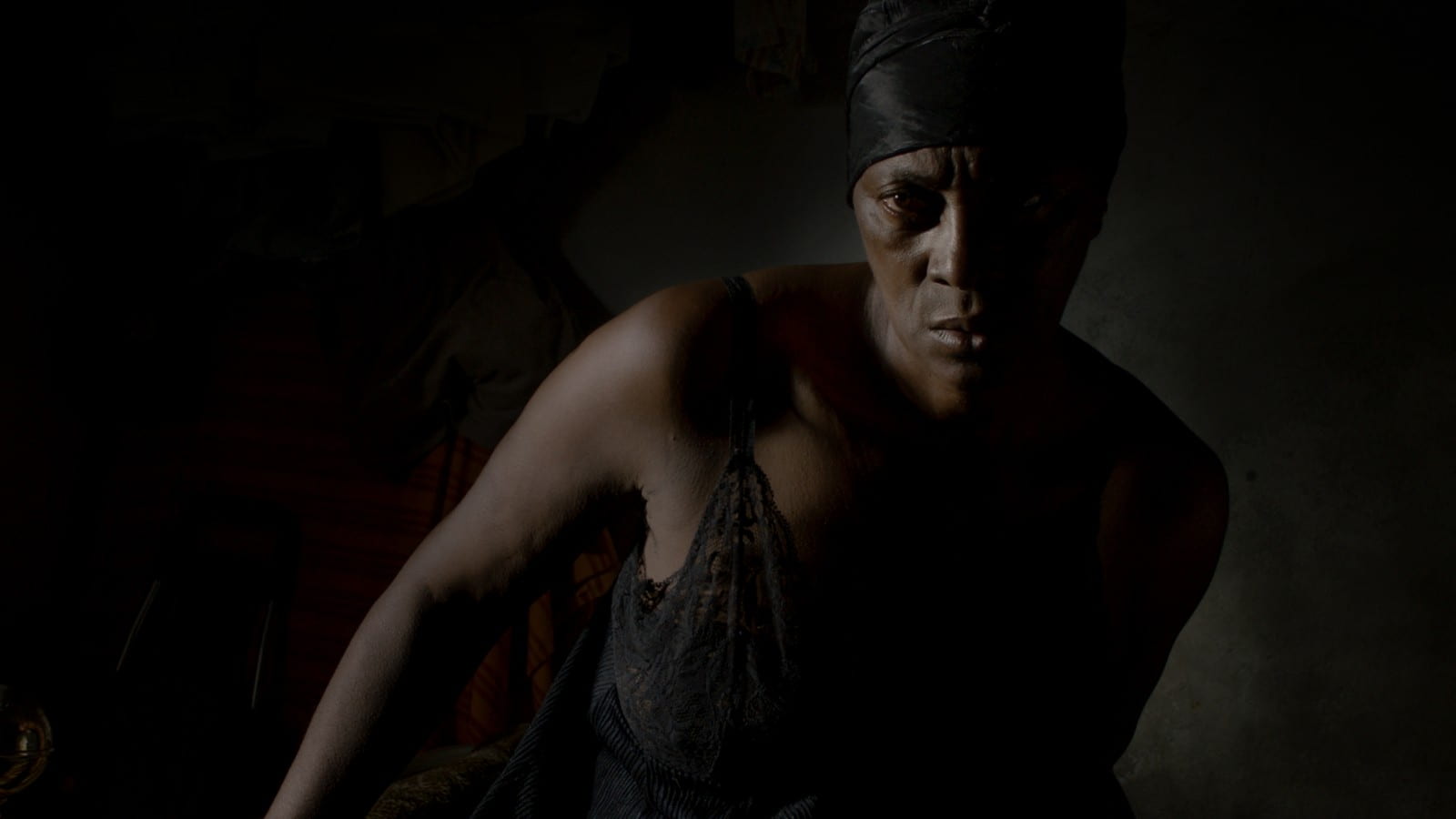Vitalina Varela is playing online at Northwest Film Forum from March 27th to April 10th.
–
Art-house cinema has its fair share of auteurs who prefer to pace their films with great patience, be it Bela Tarr, or Terrence Malick, or Andrei Tarkovsky, or any other of the long list of names of who fit this particular bill. It is a facet that can allow such a director to delve deeper into whatever it is they have honed their focus upon, or even further activate the subconscious throughout the viewing, that is if the audience has the patience themselves. Portuguese filmmaker Pedro Costa — director of new film Vitalina Varela — is undoubtedly one of these directors.
The film’s plot revolves around an aging Cabo Verdean woman named Vitalina Varela, who arrives in Lisbon just three days after her husband’s funeral, after waiting for several decades for her plane ticket over. Immediately after stepping off the plane, barefoot and alone, she is greeted by no one except a member of the plane’s cleaning crew, who whispers to her: “There is nothing for you here in Portugal.” These words are the first of the film’s generally sparse dialogue, which rarely exceeds the volume of a whisper. Despite immediately experiencing only quiet hostility and tragedy upon arrival, Vitalina decides to stay and make her late husband’s home her own, hoping to make sense of his last days as well as her own last few decades of absence. Simultaneously, the local priest (played by Ventura, a frequent collaborator of Costa’s) battles with his own faith in quiet desperation, wandering through the streets in the darkness until his path crosses with Varela’s. Although it is undoubtedly a narrative feature and not a documentary, much of the film’s story actually weaves together fact and fiction throughout. In fact, the titular Vitalina Varela is played by, well, Vitalina Varela herself, and the events just described as the film’s narrative actually happened to her in real life, with Varela and Costa even co-writing the film together. In many ways, this sort of story is a continuation of Costa’s approach to filmmaking as well as his oeuvre as a whole, as his career has been largely defined by not only his raw portrayal of the perspective of the marginalized (especially in specific regard to Portuguese colonial history), but also a rebuke of art for art’s sake, and an embrace of film as work or labor. For Costa, the stories are not his, and he makes no attempt for them to be. By all means, Vitalina Varela is Vitalina Varela’s film.

Now, even with this particular perspective of Costa’s in mind, there are still some very important bold artistic choices that Costa makes within the filmmaking process in order to bring this story and the emotion behind it to life. Perhaps the most important (or at least blatantly visually apparent) of these choices is the film’s lighting. Almost every shot is steeped in the most extreme chiaroscuro I have ever seen in a film, with incredibly dramatic contrast between the abyss-like shadows and the little bit of the frame that Costa chooses to leave lit. You could count the shots on one hand that are not overwhelmed by the miasma of darkness that hangs over the Lisbon slums that all these desperate Cabo Verdeans have been forced into, cut off from the rest of the city by darkened tunnels and the lasting colonial memory of Portugal’s history. That’s not to say that the film ever disembarks from the perspective of these Cabo Verdeans and ventures elsewhere, yet this memory is unquestionably laced within the darkness that hangs over the film as a whole. Another one of the most effectual artistic choices that Costa and Varela make is in regard to the film’s score, which is, in fact, nonexistent. Instead, the film’s audio-sphere is entirely made up of diegetic sound, often the only score being the neighborhood’s ambiance of people talking, TV’s playing, and the like, all muffled through the walls of Vitalina’s decrepit and unfamiliar home. Although it is not a silence per se, the film’s choice to omit the score entirely only adds to the air of desperation, dejection, anger, and depression that hangs over the film like the darkness, and its metaphorical silence creates a feeling of spiritual abandonment, only adding to hole left by Varela’s literal abandonment as well.

Let’s not forget, however, that this is Vitalina’s film. Throughout the film’s 2 hour runtime, she wanders aimlessly throughout the dilapidated home which she was meant to share with her late husband, ghost-like in her unease. Her decades of abandonment and absence have led her to this place, empty and disheveled, left alone in an unfamiliar place to grapple with her own aching feelings of loss, love, and anger. She gradually becomes a greater part of this community that seems to have been left behind by the world, yet at no point do she or any of the other characters she encounters connect, always looking just past or to the side of the camera just as they do to each other. As a result, the film’s stoic reservedness paired with its glacial pace and Vitalina’s overwhelming emotions creates an emotional experience that is almost entirely ineffable, something that feels simultaneously so infinite and intimate in the scale of its bleakness.
Vitalina Varela is undoubtedly the most challenging film of the year so far. It is incredibly slow, sparse in dialogue or even real character interaction, almost entirely absent of light, and extremely emotionally dense and spiritually overwhelming. And yet, it is also the best film that has come out of this godforsaken year so far. It is a truly unique and astounding experience that feels different from pretty much everything else that came before it in some way.
4.5/5 STARS
